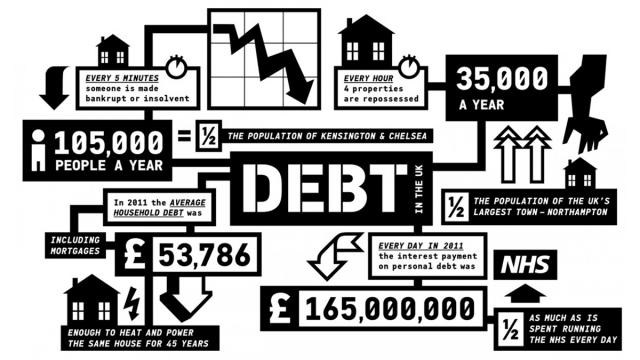
Since the fire at Grenfell Tower in West London that claimed the lives of at least 80 people in June, attention has sharply focused on U.K. local authority spending and decision making. Many unanswered questions remain about Kensington and Chelsea council's priorities and the way it manages council housing, but the problem is wider than that. Tests on public buildings since the Grenfell fire, including social housing and hospitals, revealed that a vast majority of cladded high-rises fail safety tests. The degree of mistrust in councils' housing management is visible on the Chalcots Estate, in London's Camden, where residents are crowdfunding money to carry out independent safety checks on recent refurbishments.
Attention on the inadequate quality of social housing adds weight to a growing movement of citizens auditing local government spending. As Occupy.com reported in 2015, debt activists in the U.K. are part of a continental surge aimed at opening up the books and forcing reviews of public money flowing into the financial sector instead of social spending – particularly funds deemed illegal or illegitimate.
The trend didn't come from nowhere. This movement has learned from campaigns in the Global South challenging illegal or unjust debts since the 1980s.
London Calling
In 2014, residents in England acquired the right to inspect their local councils' accounts through the Local Audit and Accountability Act. It is in London, a global capital of finance and corruption, where people are most using these laws to undercut the corporate interests.
The People's Audit has encouraged residents of the South London borough of Lambeth to question local spending and, in the process, reclaim democratic oversight. The group, consisting of a dozen local residents, analysed accounts, contracts, invoices and correspondence relating to expenditure. They used the 2014 legislation that obliges councils to open up their accounts for a 30-day period of inspection, and recovered hundreds of documents they then analysed and summarised in a report published in July.
The report found "evidence of extensive financial mismanagement and failings in financial governance potentially costing millions of pounds."
Details of the alleged mismanagement include over-paying building contractors, price-fixing for building tenders and the council's unawareness of what it is spending money on, and to whom. Councils have faced a reduction in government funding by 40 percent since 2010 and any overspending – whether through negligence or corruption – hits already stretched frontline services.
The decline in government grant funding comes as a result of austerity measures, justified by the bank bail-outs that in themselves were arguably illegitimate and should be audited.
LOBO & PFI Scams
Addressing suspect bank deals, the citizen network Debt Resistance U.K. continues to work on Lender Option Borrower Option, or LOBO, loans. These long-term loans with varying interest rates that councils took out from banks – especially in the early 2000s before the crisis – are often such complex financial products that councils could not understand what they signed.
Debt Resistance characterises these loans as a "lose-lose bet" for councils, which are now locked into contracts for up to 70 years, paying interest rates up to five, seven and even 10 percent. Local authorities can always borrow from the central government through the Public Works Loan Board, which is cheaper, especially now that interest rates are low.
But U.K. government policy has encouraged councils to tap into the financial markets, a strategy exploited by banks and brokers who lured councils into the LOBO scam through initially low teaser rates and financial advisers who had interests in the brokerage firms.
Making use of the powers under the Local Audit and Accountability Act, Debt Resistance U.K. has supported residents in dozens of councils across the country to file objections to their councils' LOBO spending.
Public Finance Initiatives remain another systemic financial mismanagement problem for local authorities in Britain. These public-private partnerships have been promoted for the last 20 years as a means for public infrastructure projects to gain private investment, whereby the eventual ownership of schools, hospitals, housing and the like passes over to the public sector following repayment. But the reality is very different. Today Britain owes over £300 billion in PFI debts, which the group People vs. PFI asserts is "institutional theft".
PFI is especially prominent in the National Health Service, where it accounted for nearly 90 percent of capital investment in new hospitals between 1997 and 2007.
The NHS is at a breaking point due to lack of funding, yet over £2 billion per year is flowing to private companies through PFI contracts. In addition to cost, other problems with PFI include tax avoidance, which it enables through offshore ownership of companies, and lack of transparency. Campaigners like People vs PFI have struggled to even see the contracts of the deals.
Reclaiming Democracy
These three campaigns in the U.K. have strong parallels with the municipalist movement in Spain. In local elections in 2015, many councils – including Madrid and Barcelona, the country's biggest cities – were taken over by progressive coalitions that are now learning to govern the cities in the interests of the people. One of the strategies they use is auditing debt: according to a 2012 change in the Spanish constitution, municipalities are forced to prioritize debt repayments over social spending.
Madrid concluded the first phase of its audit on public spending and policy in May when it released a report on the social, economic, gender and environmental impacts of its policies. The aim is to work toward correcting the negative impacts.
Although diverse in focus, each of the debt audits share common strategies and focus. These campaigns are broader than a technical exercise to understand which debt was illegitimate, which spending was illegal, or which public deals were corrupt. They are about protecting democracy by restoring fairness to finance. For citizen debt audits, the only way to challenge the power of banks is to reveal their crimes – and build a public movement that mobilizes around the injustice, demanding the public money be spent in the public interest.
3 WAYS TO SHOW YOUR SUPPORT
- Log in to post comments
















